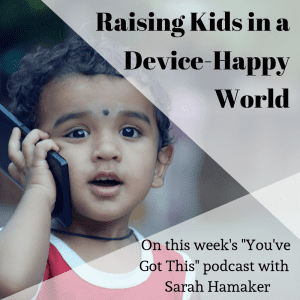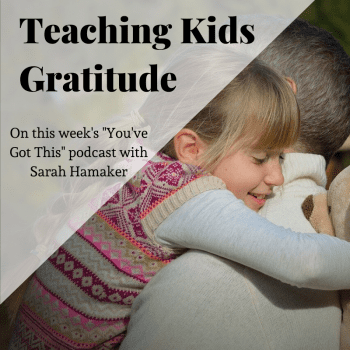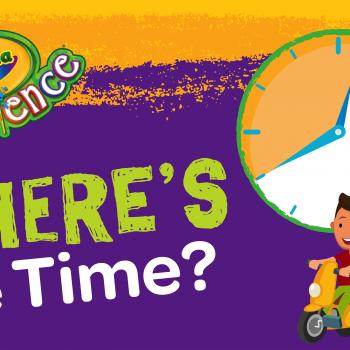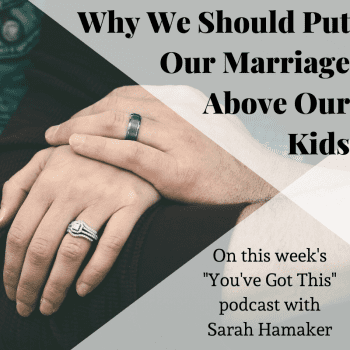 The following is an excerpt from my interview with Dr. Nicole Beurkens on my podcast, You’ve Got This.
The following is an excerpt from my interview with Dr. Nicole Beurkens on my podcast, You’ve Got This.
A unique combination of psychologist, nutritionist, and special educator, Nicole has 22 years of experience supporting children, young adults and families. She is an expert in evaluating and treating a wide range of learning, mood, and behavior challenges including ADHD, autism, anxiety, mood disorders, brain injury, and sensory processing disorder. Nicole holds a doctorate in Clinical Psychology, master’s degrees in Special Education and Nutrition, and is a Board Certified Nutrition Specialist. She is the founder and director of Horizons Developmental Resource Center in Grand Rapids, Michigan, where she leads a multidisciplinary team dedicated to exceptional evaluation and integrative treatment services, research on innovative treatment protocols, and professional training on best practices. She is a highly sought-after international consultant and speaker, award-winning therapist, published researcher, and best-selling author. Her work has been highlighted in numerous publications, and she’s an expert media source. When she isn’t working, Nicole enjoys spending time with her husband and four children.
This year, our middle and high schools went 1:1 with laptops for all students. I’m not quite sure how I feel about that.
Nicole: That’s really interesting because actually, there’s some school districts now that have been doing that for a while that are backpedaling on that because they’ve discovered that the research doesn’t support that having laptops is very helpful for learning. I think a lot of us parents have concerns about the amount of time that kids are spending in general in front of screens every day.
I agree, but I will say that our school pyramid has been pretty thoughtful about how to integrate laptops into the classroom setting, so it will be an interesting year to see how it goes.
Nicole: I think our big concern as parents is we see that kids in general are spending more and more time on devices. It becomes difficult to think about how to regulate kids’ use of those devices and how to manage amount of time spent when we realize that “Oh, my goodness. Our kids are getting home at the end of the school day after being on computers all day and want to be online more.
One of the things that I definitely wanted to talk with you about are some of the detrimental effects of screen time. Because when I coach parents, sometimes they’ll talk about their kids’ symptoms and one of the questions I ask, “Well, how much screen time do they have?” That coupled with, “How much sleep are they getting?” Because both of those can kind of mimic some of the hyperactivity, the lack of focus when kids have too much screen time and too little sleep.
Nicole: We are seeing just a huge increase in the number of kids and teenagers who are exhibiting symptoms like ADHD, attention problems, hyperactivity, impulsivity problems but also things like anxiety, depression, dysregulated mood. There is a direct connection for many kids between those types of symptoms and the amount of time that they’re spending in front of screens and there’s a big connection between the sleep issues too.
I have been seeing this in clinical practice over the last 10 to 15 years as screen time has become more and more a part of the fabric of everyday life for kids. Technology is here to stay. It can bring amazing benefits to our lives and to our children’s life, but there is also, as with anything, a downside when there is excessive use.
I think one of the challenges is we’re the first generation of parents raising kids in this 24/7 constantly connected culture of devices all the time, and so we don’t really have a model to look at in terms of how do we manage use of devices for ourselves as adults and for our kids. It’s one big experiment right now and it’s a huge question that parents have on their minds is how to manage the screen time piece and how this is impacting their kids. The research is showing that as kids’ use of electronic devices, their amount of time spent in front of screens, on social media, these kinds of things increases so does the risk of symptoms like ADHD, serious mood disorders, anxiety, those types of things. So, parents are right to be concerned about it.
My high schoolers don’t have smartphones—they have iPods they bought with their own money that they use like WiFi phones. We actually still have a prepaid flip phone for when one of our kids would need to call us. But that’s a hard line we’re not willing to cross just yet to give our kids these amazing devices in the palm of their hands.
Nicole: I think what has happened is we’ve gotten to this place where these devices, especially the handheld devices, the tablets, the smart phones, the iPads, have become such a part of life. They’re even marketed as something that can and should be used with even young kids. My family was at dinner on the way back from a road trip recently and we saw a family with two young boys under the age of 6 sitting at the table with their own iPad tablets set up. This has become more of the norm.
As parents, we have to stop and realize that this is the equivalent of giving a Ferrari to a kid who doesn’t even have their driver’s license yet. We’re putting really powerful devices in the hands of children and teenagers who haven’t yet developed what we call the executive functions in their brain to really consider the risks and manage the use of that well. We need to teach that, but what I’m seeing is so many parents who are just giving kids these devices and not following through with having limits on them or using parental monitoring software or having ongoing communication and conversation with kids about what they’re accessing, what they’re being exposed to. The reality is that there’s a lot of stuff that kids can access even without meaning to.
You mentioned some of the anxiety and hyperactivity but I think some of the additional research shows that kids had trouble even learning to read and to think critically in school because of too much time on these devices.
Nicole: There’s many studies now showing the negative impact on communication development, speech and language development for children who have excessive use of digital media, of screen time at young ages. It negatively impacts their ability to just sit and focus. They become very impulsive, hyperactive, looking for that next piece of stimulation, not able to initiate or develop their own interests or activities and that impacts their learning, their reading, and those kinds of things.
What’s frustrating and what’s hard for parents is a lot of the companies that create apps, software devices, they market these things as, “Oh, this is going to help your child learn. You should put your babies in front of these things.” But the reality is that is not true. In fact, the American Academy of Pediatrics, which is the only child-focused professional organization that has really come out with good guidelines for this, says children under the age of 2 should not be using screens with the exception of doing things like Facetime with a family member. Between ages 2 and 5, we should be limiting screen time to an hour a day of high-quality programming with a parent or another adult there to guide the use of that, to read an interactive book together, to watch a video or something together.
When we just put our young kids in front of screens as a way to occupy their time, keep them from bothering us—while it may be convenient in the moment, it really does take a toll on not only their physical develop but also their emotional development and cognitive development.
Of course as kids get older, our guidelines are more around prioritizing other meaningful activities above screen time. Encouraging our kids to get physical movement and reading an actual book, getting your homework done, your chores done, spending time outside, all of these things are the things that we prioritize and spend our time doing. And then if there is extra time, that is time that could be for some screen activities.
We need to model that as parents as well. If we can’t put our phone down for dinner, if we can’t read a book to our preschooler without checking our phone, if we can’t go outside and throw a ball with our middle schooler for 20 minutes without having to look at incoming text or whatever, that’s sending them a dual message. This is I think one of the most important times where we need to practice what we preach.
Nicole: Parent-modeling is hands down one of the most important things that needs to be a part of this discussion because children, even really young children, they see what we do. If we’re saying, “You need to out your screens and you need to do other things,” but then what they’re seeing is us constantly on devices, constantly distracted, constantly multitasking, there’s a mismatch there and they pick up on that. I think some simple starting points that I give families are device-free meal times.
In my personal and professional opinion—and the research shows this over and over again—meal times are a time for eating, for relational social connection, for communication. There’s so many important things about family meal times for children and for adults. Devices have no place there.
One of the takeaways for me is just the reminder that first of all as a parent, it’s my job to model what I expect my children to do with their devices. And secondly, to remember that yes, devices and smartphones are great but it’s really hard to put that genie back in the box, so we really need to make sure that we are very careful about when we invite those devices into our homes.
Nicole: These devices come with certain amounts of parental protections that we should utilize. I encourage parents when you bring those devices into your home to look at some of the other apps that are available. Qustodio is the one that I use to make it easier for us as parents to manage this.
To hear more great advice and stories from Nicole, listen to “Raising Kids in a Device-Happy World” on the “You’ve Got This” podcast.
















